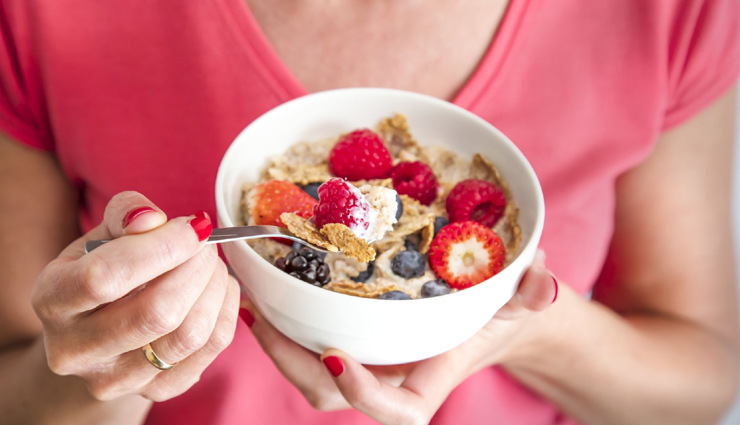- Home›
- Healthy Living›
- 8 Ways To Manage Blood Sugar Levels Naturally
8 Ways To Manage Blood Sugar Levels Naturally
By: Priyanka Maheshwari Wed, 25 Oct 2023 8:03:13

Glucose, also known as blood sugar, plays a crucial role in maintaining your body's proper functioning. The challenge arises when blood sugar levels deviate from the healthy range. Today, there is a growing prevalence of diabetes and prediabetes, chronic conditions linked to elevated blood sugar. Lifestyle and dietary choices can influence your blood sugar levels, offering the possibility of naturally reducing them. To effectively lower blood sugar, it is essential to comprehend the mechanisms behind blood sugar elevation. Let's delve into the specifics.
Elevated blood sugar, or hyperglycemia, is characterized by a blood glucose (sugar) level exceeding 125 mg/dL after fasting for at least 8 hours or surpassing 180 mg/dL two hours after eating.

# Make Exercise A Part Of Your Daily Routine
Engaging in regular exercise offers multiple benefits, encompassing not only weight management but also a positive impact on your insulin sensitivity. Studies indicate that physical activity can contribute to the prevention of insulin resistance. Enhanced insulin sensitivity leads to reduced blood glucose levels since cells become more efficient in utilizing sugar. Furthermore, exercise promotes increased sugar consumption by your muscles. Activities like brisk walking, swimming, weightlifting, running, cycling, hiking, and dancing serve as examples of exercises that can aid in the natural management of blood sugar levels.
It's important to exercise caution and monitor your blood glucose levels following physical activity, especially if you are taking medications to manage hyperglycemia, as this can provide insights into how your blood sugar levels may fluctuate.

# Try A Low-carb Diet
Carbohydrates undergo a transformation into sugars during the process of digestion. The regulation of sugar utilization and storage is primarily managed by insulin. Consuming an excessive amount of carbohydrates or encountering issues with insulin functionality can lead to elevated blood sugar levels. Scientific research suggests that adopting a lower-carbohydrate diet is among the most effective approaches for reducing blood sugar and shedding excess weight simultaneously. Remarkably, this dietary approach offers not only short-term benefits but also the potential for long-term improvements in blood sugar control.
To control your carbohydrate intake and adhere to a blood sugar-lowering diet, consider these steps:
- Keep track of your macronutrients and determine the appropriate carbohydrate intake based on your BMI.
- Minimize added sugar, such as skipping it in your coffee or tea.
- Practice portion control to manage your food servings.
- Opt for whole foods, with a preference for home-cooked meals.
- When dining out, select healthier menu options that prioritize vegetables and lean protein.
- Replace sugary snacks with nuts and seeds for a more wholesome choice.

# Load Up On Fiber
Dietary fiber, particularly soluble fiber, plays a significant role in the regulation of blood glucose levels. It has the ability to decelerate the digestion of carbohydrates and the speed at which sugar enters your bloodstream. This, in turn, aids in preventing sudden spikes in blood sugar levels. Furthermore, soluble dietary fiber is linked to enhanced insulin sensitivity.
For individuals with type 1 diabetes, a high-fiber diet can also be beneficial in terms of improving blood sugar control and decreasing the risk of abrupt drops in blood sugar levels. To increase your fiber intake, incorporate vegetables, fruits, legumes, and whole grains into your meals, as these foods are rich sources of fiber.

# Manage Your Weight
Studies indicate that a mere 7% decrease in body weight could potentially reduce the likelihood of diabetes development by up to 58%. Furthermore, research suggests that combining weight management and the integration of physical activity into one's lifestyle as part of a comprehensive approach may be even more effective in lowering blood sugar levels compared to a commonly prescribed diabetes medication.
Given that waistline measurement plays a crucial role in assessing diabetes risk, it is imperative to monitor your waistline closely. A waist measurement exceeding 35 inches for women and 40 inches for men may elevate the risk of hyperglycemia and type 2 diabetes.

# Stay Hydrated And Drink More Water
Staying hydrated by consuming water consistently during the day can aid in averting elevated blood sugar levels, as water facilitates the removal of excess sugar from your system through urine. Research findings suggest that individuals who increase their water intake have a reduced likelihood of experiencing hyperglycemia. Replenishing your body with plain water or mineral water may serve as a strategy to reduce your blood sugar levels and mitigate the risk of diabetes development.

# Practice Stress Management
Scientific studies indicate that stress has a direct impact on your blood sugar levels. Stress triggers the release of two hormones, namely glucagon and cortisol, which can lead to an increase in your blood sugar levels. An investigation involving students demonstrated that practices such as regular exercise, meditation, and relaxation effectively lowered both stress levels and blood glucose levels.
Moreover, there is emerging evidence to suggest that stress reduction techniques like yoga and mindfulness meditation may potentially address issues related to insulin secretion in individuals dealing with chronic diabetes.

# Sleep Enough And Sleep Well
Poor sleep patterns and inadequate sleep can impact your hunger, disrupt insulin sensitivity, and elevate your blood sugar levels. When your body lacks sufficient sleep, it produces reduced levels of growth hormones while increasing cortisol levels in the bloodstream. These two hormones hold significant significance in the regulation of blood sugar. Prioritize obtaining both high-quality and an adequate quantity of sleep on a daily basis.

# Add Apple Cider Vinegar And Cinnamon To Your Diet
Apple cider vinegar, often abbreviated as ACV, has the potential to contribute to a reduction in fasting blood glucose levels. Research studies indicate that ACV can have a notable impact on the body's response to sugars and may enhance insulin sensitivity. You can incorporate ACV into your diet by diluting it with water or using it as a salad dressing.
Similarly, cinnamon offers a natural means of reducing blood sugar levels by mitigating insulin resistance at the cellular level. Some evidence suggests that cinnamon might lower blood glucose by as much as 29%. Including cinnamon in your meals can slow down the digestion of carbohydrates, resulting in a more controlled increase in blood sugar levels after eating. It's advisable to consult your healthcare provider before introducing these elements into your diet, especially if you are already taking medications for blood sugar management.





